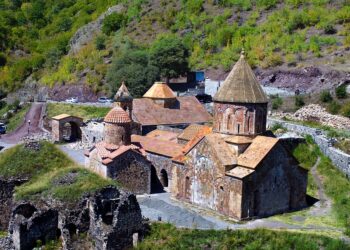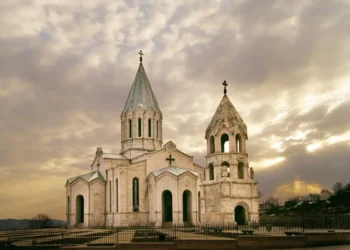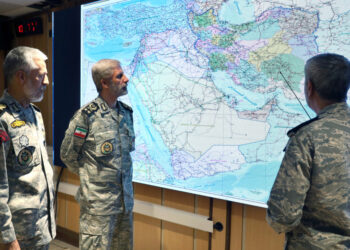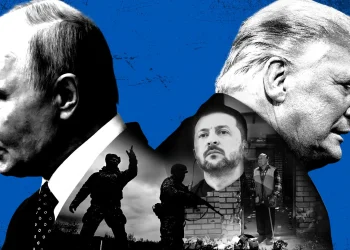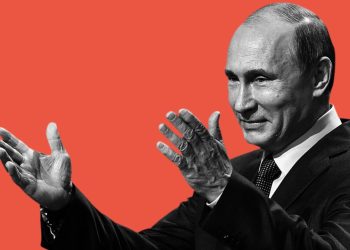YEREVAN (Realist English). I’ve been thinking for a long time whether to write this article or not. But I still decided that it was worth doing it, especially since I once gave my word to one good person.
The story that prompted me to write about this happened 10-12 years ago. One day, out of necessity, I signed up for a therapist in a military polyclinic. After being discharged from the Armed Forces, as a reserve officer, I was attached to a military polyclinic, which was located in the south of Moscow. This military polyclinic was considered one of the best, and mostly employees and reserve officers of the Special Construction of Russia were attached to it.
I arrived at the medical institution on time and began to wait for my turn. Soon another visitor came up – a neat old man in his 80s, who sat down next to me. After a couple of minutes, he asked if I was standing in line for a cardiologist? I said no. We were sitting next to each other, and he decided to get to know me and introduced himself as Ivan Viktorovich. I gave my Armenian name – Aram. At first he was surprised to hear my name, then he asked if I was Armenian. I replied that I was Armenian.
To his second question, what am I doing now, I honestly told him that I am a lieutenant colonel of the reserve of the Armed Forces of the Russian Federation and that after being discharged from the Army, as a civilian, I work as a military journalist in one of the central magazines of the Russian Defense Ministry. Then came the usual inquiries, where I studied, where I served, etc. I briefly told about my military life, that I mainly served as a political worker, listing several military districts where I served.
Then gradually he began to tell me that he had worked for a long time in the embassies of the Soviet Union in different countries, and that during his work in Lebanon he had a good friend from the Armenians there with the same name as mine – Aram. From Ivan Viktorovich’s stories, I understood that he worked in the USSR diplomatic representative offices during the 1960s and 1980s.
At the most interesting moment of his story, a cardiologist came out and invited my interlocutor into the office. Getting up, Ivan Viktorovich asked me to wait for him if possible. Then I went to my therapist and after the doctor’s appointment I waited for my interesting interlocutor.
He also left the doctor’s office after a while, and we slowly headed to the exit of the polyclinic. I invited him to a nearby cafe, but he refused. Not far from the clinic there was a small park with benches, and we went there. There we sat down, and he continued his story.
My interlocutor told me that he had visited many countries. He mainly worked in the Middle East and in some Latin American countries. And according to him, everywhere the Armenian Diaspora provided the Soviet Union with all possible assistance and great support.
Ivan Viktorovich said that many Soviet diplomatic missions in different countries organized their events thanks to the organization and immeasurable love and respect of foreign Armenians for Moscow. Ideological stereotypes about the difference between capitalist and socialist systems, the differences of peoples or states in such cases receded into the background. The majority of foreign Armenians, from an ordinary worker to a large businessman, have always provided not only great financial support and solved important organizational issues, but also assisted in other issues when necessary… Here he became quiet.
To my clarifying questions, where he especially remembered the help of the Armenian Diaspora, he recalled the capital of Lebanon, Beirut, the capital of Syria, Damascus, and the capital of Argentina, Buenos Aires.
He spoke about the Armenian Diaspora of the Middle East, and especially Lebanon, with special warmth and love. He spoke warmly about the Lebanese Armenian Aram, who had his own cafe. They served the most delicious and fragrant coffee in the area. The Lebanese Armenians, and especially the aforementioned Aram, helped him out twice: once in Beirut they saved him from the persecution of Israeli intelligence agents, and the second time from French counterintelligence. There was a secret room in the Aroma Cafe in Beirut, the existence of which no one knew except the owner. And twice the Armenians saved him, perhaps, from death.
I was impressed by his stories. And I imagined the narrow Arab streets of the Lebanese capital, secret meetings of representatives of the Soviet embassy with activists of the Palestinian liberation movement, surveillance and pursuit of Israeli intelligence, and much more…
To my clarifying question whether he was a Soviet intelligence officer, he very diplomatically evaded the answer. But he began to talk about Soviet intelligence officers of Armenian origin. He remembered and listed several surnames: a wonderful married couple ща Gevork and Gohar Vartanyan, Ivan Agayants, Ashot Hakobyan, Mikhail Allakhverdov, Ruben Agamalov… So far, we don’t know much about the life and work of these outstanding Soviet intelligence officers. Almost all of their heroic activities are still classified. But even the few facts that have become known to us are incredibly impressive!
Holding my breath, I listened to the amazing stories of the worthy and brave man Ivan Viktorovich. Two hours of our conversation flew by in an instant. And I asked the last question: “Does he think that now the Armenian Diaspora abroad is also actively helping Russia as in Soviet times or not?”. After thinking about it, he just smiled slyly, but did not answer…
And at the end of the conversation, he gave me an order: “Son, as a journalist, someday you will definitely write about the Armenian Diaspora and how they actively and selflessly helped the Soviet Union.”
He then told another interesting story about an Armenian family from the Syrian city of Aleppo, with whom he had been friends for a long time, and whose members at one time also provided great support to the USSR embassy in Syria. At the time of our conversation, a civil war known as the “Arab Spring” was already raging in Syria and other Arab countries. Then thousands of people died during the war, and hundreds of thousands became refugees. He said he was very worried about the fate of this family. International terrorists and opponents of Bashar al-Assad’s government have already effectively controlled Aleppo in Syria. Between the words, he asked me, if possible, through the Armenian Diaspora or the Syrian Armenian support funds in Armenia, to find out the fate of this family.
We agreed that we would meet again. And by the next meeting, he promised to find and give me the address of this Armenian family from Aleppo in his archive at home. We exchanged contacts and said a warm goodbye.
Life spun so much that soon after this meeting I left for an urgent business trip. When I returned to Moscow a month later, I dialed his phone number to meet with him, but a female voice on the other end of the phone said that, unfortunately, Ivan Viktorovich had recently died…
On May 31, 2022, a monument to the legendary Soviet intelligence officer of Armenian origin, Hero of the Soviet Union Gevork Vartanyan was unveiled in New Moscow on the territory of one of the schools. One of the organizers of the monument was the Union of Armenians of Russia (SAR). One of the leaders of the SAR invited me in advance to take part in the grand opening of the monument. The unveiling of the monument was to be attended by high-ranking officials of the Foreign Intelligence Service (SVR) of Russia on a federal scale, veterans of intelligence and other honored guests. The guests included in the list were very carefully checked. I was checked, approved and included in the guest list.
The opening ceremony of the monument was held at a high level. Then, after the ceremony, the SAR organized a reception in one of the best restaurants of the district on the occasion of the unveiling of the monument to the famous Armenian intelligence officer.
Among those invited and present were former Soviet intelligence officers, elderly people who knew G.A. Vartanyan well. I was sitting among these worthy people who, raising their glasses, said very beautiful words to the great patriot of the USSR and Russia G.A. Vartanyan. Various stories from his life were told. One of the speakers recalled his feat in 1943, when, thanks to Vartanyan, the plans of the Nazi special services to eliminate the heads of the anti-Hitler coalition: Stalin, Roosevelt and Churchill were thwarted. At the same time, he recalled Gevork Andreevich’s stories that representatives of the Armenian community of Iran also took an active part in the Soviet operation.
After a wonderful speech by the first deputy prefect of New Moscow, Igor Okunev, I was given the floor as a military journalist. I raised a toast to all the patriots of Russia, and reminded that Armenians have always served the Russian Empire, the Soviet Union, and now the Russian Federation with honor, citing as an example the feat of Lieutenant Colonel Andranik Gasparyan, who during a Special military Operation was one of the first to be awarded the title of Hero of Russia, as I recently wrote.
At the end of this event, a respected man, a former Soviet intelligence officer and a friend of Gevork Vartanyan, who knew his family well, sat down with me.
Word after word, I briefly told him about the story that I outlined here above. And I asked him for advice on whether I should write such an article. He supported me and said that it was true, in many countries Armenian communities provided great support to Moscow. Then my interlocutor added that it would also be a tribute to the memory of Gevork Vartanyan…
Aram Khachatryan is a military journalist, historian, publicist, member of the Union of Journalists of Moscow, special to Realist News Agency




